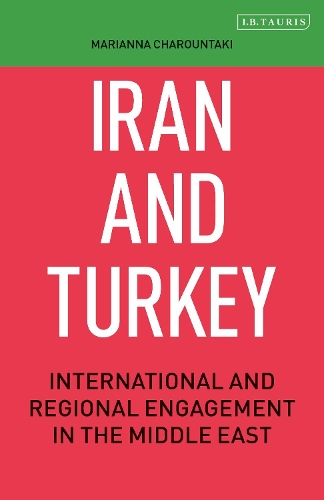
Iran and Turkey: International and Regional Engagement in the Middle East
(Paperback)
Available Formats
Publishing Details
Iran and Turkey: International and Regional Engagement in the Middle East
By (Author) Marianna Charountaki
Bloomsbury Publishing PLC
I.B. Tauris
19th September 2019
19th September 2019
United Kingdom
Classifications
Tertiary Education
Non Fiction
Social groups: religious groups and communities
Political science and theory
Middle Eastern history
Geopolitics
International relations
Political structures / systems: autocracy, totalitarianism and dictatorship
327.550561
Physical Properties
Paperback
368
Width 138mm, Height 216mm
426g
Description
The foreign policies of Turkey and Iran seem increasingly to dictate the course of events in the Middle East. More recently, and especially following the Syrian crisis, the spotlight has turned to these states' dynamic re-entry onto the political stage, revealing them as key players with an international role in efforts towards the balance of power across the region. This book traces the major determinants of Turkish and Iranian foreign policies and their influence on events in the Middle East. Based on an examination of these states' politics and policies since 1979, and using material gathered from interviews with leading political figures from Turkey, Iran and the Kurdistan Region of Iraq, Marianna Charountaki offers fresh insights into how we understand the contemporary global order. Of particular importance, this book shows, is the effect of both external and internal factors on foreign policy and how the interaction between state and non-state actors informs political decisions. In placing these issues in a theoretical framework, Marianna Charountaki pioneers a new conceptual map within International Relations. An interdisciplinary study that provides a fresh new perspective, this book will be of particular interest to scholars of International Relations, Politics, Foreign Policy, Kurdish and Middle East Studies.
Reviews
There is a vital need for this book. Summing Up: Recommended. Upper-division undergraduates through faculty. -- R. W. Olson, emeritus, University of Kentucky * CHOICE *
Author Bio
Marianna Charountaki is a Lecturer in Kurdish Politics and International Relations in the School of History, Politics and International Relations at the University of Leicester, where she is also the Head of the Kurdistan International Studies Unit. Her research interests range from international relations and foreign policy analysis to the international relations of the broader Middle East. She has published the monograph The Kurds and US Foreign Policy: International Relations in the Middle East since 1945 (2010) as well as articles in the journals Journal of American Foreign Policy Interests, Third World Quarterly and Journal of Arabian Studies.
